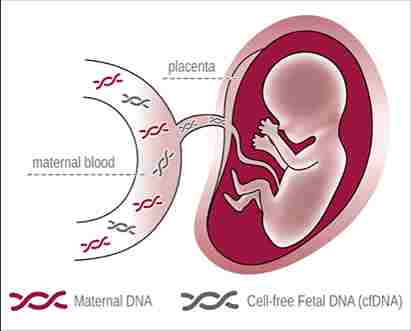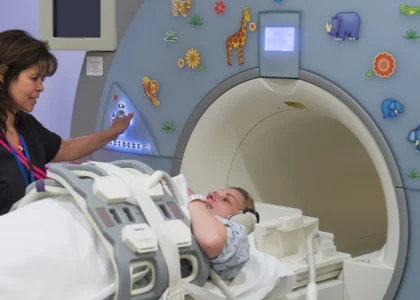From what to expect during the procedure to who should get it, here’s all the information you need about the NIPT or the noninvasive prenatal screen (NIPS).
Expectant parents experience both excitement and anxiety while welcoming a child into the world. It’s normal to have worries and inquiries about your pregnancy and your unborn child as you prepare for the advent of a new life. In today’s era of medical advancements, prenatal screening has evolved to provide expectant parents with invaluable insights into their baby’s health and development. One such breakthrough is the Non-Invasive Prenatal Test, commonly known as NIPT.
In this blog, we will take you through the process of NIPT, explaining what it is, why it’s important for prenatal care, and what to expect from the procedure.
What Is Non-Invasive Prenatal Testing (NIPT)?
The noninvasive prenatal test, or NIPT for short, is a screening procedure used to assess the likelihood of chromosomal abnormalities such as Down syndrome (trisomy 21), Edwards syndrome (trisomy 18), and Patau syndrome (trisomy 13). It is an advanced development in prenatal care to analyse and find particular genetic disorders and chromosomal abnormalities in the developing fetus using only a small blood sample from the pregnant woman.

It’s critical to keep in mind that the NIPT is a screening test that determines the likelihood that the fetus will have a specific issue. This is not a diagnostic test. You will have to undergo a diagnostic test like CVS / amniocentesis if the NIPT yields a positive result and you wish to confirm that your child has a specific condition. A fetal medicine specialist will provide information about prenatal testing and help you make an informed decision about your options.
NIPT Process: What to Expect?
- Consultation: Based on your medical history, age, and other pertinent factors, a fetal medicine specialist will discuss the benefits, limitations, and significance of NIPT.
- Blood Sample Collection: Approx. 15-20 cc of blood sample will be taken from your forearm vein during a regular prenatal checkup. The procedure is short, relatively painless, and risk-free for both you and your unborn child.
- Lab Analysis: The collected mother’s blood sample also contains traces of Fetal DNA, and this DNA is analyzed using advanced sequencing techniques in specialised genetic labs. This DNA analysis provides insights into the genetic makeup of your baby in the womb.
- Interpretation of results: You will get your NIPT results usually in 10-14 working days. These findings will often indicate whether your baby is at “low risk” or “high risk” for specific chromosomal abnormalities.
What Can It Tell You?
The NIPT does not screen for all chromosomal abnormalities. This advanced screening method detects specific chromosomal abnormalities and genetic conditions like Down Syndrome, Edwards syndrome, Patau Syndrome, Monosomy X and some common chromosomal abnormalities.
When should the NIPT test be done during pregnancy?
Non-Invasive Prenatal Testing (NIPT) is typically recommended to be done anytime after 10 weeks of pregnancy. Typically, there’s not enough fetal DNA in a pregnant woman’s blood before 10 weeks of pregnancy.
The timing for the NIPT test is important for several reasons, including:
- Fetal DNA availability
- Early detection
- Option to undergo diagnostic test in case of ‘high risk’ result
- Legal limit for termination of pregnancy in case of abnormal reports.
- Confirmation of pregnancy viability
Significance of Non-Invasive Prenatal Testing:

1. Early detection of genetic abnormalities:
NIPT is highly sensitive in detecting genetic abnormalities with a detection rate of approx. 99 per cent for Down syndrome (Trisomy 21), 97-98 per cent for Edwards syndrome (Trisomy 18), and Patau syndrome (Trisomy 13). Its accuracy and early detection capabilities help doctors and parents make informed decisions.
2. Minimised need for invasive procedures:
Because of its high accuracy, NIPT has led to a significant reduction in the number of invasive procedures.
3. Multiple pregnancy assessment:
NIPT can also provide insights into the genetic health of twins, aiding in the management of complex pregnancies.
4. Screening for rare conditions:
Apart from the common trisomies, NIPT can also screen for certain rare genetic conditions.
Conclusion
Non-Invasive Prenatal Testing (NIPT) is a crucial tool for making sure your unborn child is healthy and offers essential insights into their health. Your fetal medicine specialist will be with you every step of the way, providing guidance, support, and expert care as you navigate this aspect of your pregnancy journey. Remember that knowledge is power, and NIPT gives you the insights you need to make informed choices that will result in a safe pregnancy and a successful life for your child.
Get Non-Invasive Prenatal Testing in Pune
Consult fetal medicine specialist Dr Tejas Tamhane to manage complicated or high-risk pregnancies.



